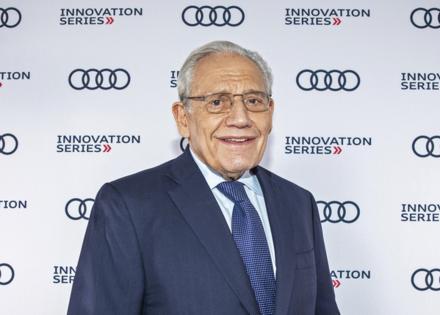Trump suit over Bob Woodward's recordings dismissed for now
Published in Political News
WASHINGTON — A federal judge in Manhattan has dismissed a lawsuit brought by President Donald Trump against journalist Bob Woodward and a publishing house over the release of interview recordings from his first term in office.
US District Judge Paul Gardephe ruled on Friday that Trump failed to “plausibly” claim that he and Woodward intended to be co-authors or that Trump had a copyright interest in his answers to Woodward’s questions. Trump’s decision to submit a copyright registration later couldn’t save his case, the judge held.
Gardephe did leave open the possibility of another round, though, saying Trump could file an updated lawsuit to take another shot at arguing over the copyright question or bring new claims under state law. Gardephe wrote it was “unlikely” Trump could prevail, but also not “futile” to let him try again. Trump also could appeal Gardephe’s decision.
Interviews are “a collaborative exercise,” Gardephe wrote, but that didn’t automatically give Trump a copyright interest.
“There is almost no support in the case law for the notion that an interviewee has a copyright interest in his responses to interview questions, and such a conclusion would run counter to animating principles of the Copyright Act,” the judge said.
A Simon & Schuster spokesperson said in a statement the company is “very pleased the court agreed with us and dismissed the case.”
The White House referred a request for comment to Trump’s personal lawyers, who didn’t immediately respond. A lawyer for Woodward also didn’t immediately respond to a request for comment.
Trump in January 2023 sued Woodward and Simon & Schuster Inc., which was acquired later that year by KKR & Co., claiming they violated his copyright interest when they published an audiobook featuring interviews he gave to the journalist in 2019 and 2020 and breached an agreement to only use the recordings for writing a book.
Simon & Schuster’s previous owner, Paramount Global, recently reached a settlement with Trump over a lawsuit alleging election interference by the company’s CBS news network in how it aired versions of a "60 Minutes" interview with then-Vice President Kamala Harris in October.
Gardephe’s ruling ends another of Trump’s remaining legal fights pre-dating his November election win, at least for now. In December, ABC agreed to donate $15 million to Trump’s future presidential foundation or museum to settle claims that one of its anchors defamed him. He secured settlements earlier this year with Meta Platforms Inc. and Elon Musk’s X over being kicked off social media platforms following the Jan. 6, 2021, attack on the U.S. Capitol.
Trump has continued to press a lawsuit against The Des Moines Register and a former pollster claiming they tried to interfere in the election. He also still faces a defamation case over comments he made during his campaign last year about five men who were wrongly convicted in a 1989 jogger rape case in New York City and came to be known as the “Central Park Five.”
Lawyers for Woodward and the publisher argued that Trump’s case should fail because federal copyright law barred government officials from claiming an interest in interviews they gave as part of their federal duties.
According to Trump’s complaint in the Woodward case, Trump participated in 19 interviews with the journalist between December 2019 and August 2020, as well as in 2016 when he was still a candidate. Woodward’s book, Rage, was published soon after the last interview. In October 2022, Simon & Schuster released the audiobook, The Trump Tapes.
Trump’s lawyers acknowledged that a number of those interviews took place at the White House, but argued that didn’t automatically mean he had spoken with Woodward within his scope of his employment as president.
After filing the lawsuit, Trump registered a copyright for the audiobook that listed him as a co-author with Woodward. Lawyers for the journalist and the publisher said that the U.S. Copyright Office didn’t delve into legal issues or rule on competing claims when it processed applications, so the fact of Trump’s registration shouldn’t defeat their arguments for why his lawsuit was legally deficient.
©2025 Bloomberg L.P. Visit bloomberg.com. Distributed by Tribune Content Agency, LLC.

























































Comments